Relevant Overviews
- Content Strategy
- Fediverse
- Online Strategy
- Online Community Management
- Social Media Strategy
- Content Creation & Marketing
- Digital Transformation
- Thinking tools
- Blockchain, Crypto, NFTs etc
- Personal Productivity
- Innovation Strategy
- Communications Tactics
- Social Web
- Media
- Politics
- Communications Strategy
- Science&Technology
- Business
- Large language models
Overview: Blockchain, Crypto, NFTs etc
A long overdue overview, just getting started. Stimulus: the idea of managing the MyHub data union and associated services using a DAO and utility token. Currently I'm curating a few articles every day, then summarising the most interesting ones here every week (cf progressive summarisation).
Related ideas not in this Overview: decentralised, p2p.
Best primers
Bitcoin/Blockchain
How to explain Bitcoin to your grandmother :
- banks are simply "intermediaries that 'keep score' of e-money" by maintaining a time-stamped ledger.
- "we have to trust in the banking system in order to trust in the money." Bitcoin is a decentralised intermediary that we don't have to trust: people can't copy/paste bitcoin.
- Everyone has a Public Key, linked to bitcoins. To send someone bitcoins, I broadcast to the Bitcoin network: "I am Public Key M; I wish to transfer X Bitcoin to Public Key N. Please check and record it on the ledger",
- that ledger is "the Blockchain... a computer file that gets constantly updated, and it is held on the computers of everyone in the Bitcoin network... built and maintained by ... Miners", who (competitively) earn bitcoins in return for validating and recording transactions. So Bitcoin is "a currency that grows in the process of people trying to maintain its integrity".
- Recording to the blockchain "makes the transaction real... coins [exist] in the historical record of the blockchain... a collaboratively-built knowledge bank ... All I have on my computer is a public key which says that I am the rightful owner to a part of that history" - so dont lose access to your Key!
DAOs
" a new kind of leaderless crypto-club... group chats with bank accounts... Web3 kids trying to tear down the old social hierarchy, only to replace it with a new, tokenized one where they were on top" - Crypto Is Cool. Now Get on the Yacht
Ethereum is a platform and a programming language ... to build and publish next-generation distributed applications.... Ethereum can be used to codify, decentralize, secure and trade just about anything... Ethereum borrows the concept of decentralized consensus that makes bitcoin so resilient, yet makes it trivial to build on its foundation
- Introducing ethereum
Based on charters taking the form of code on a peer-to-peer network, these are entities that could automate many of the tasks of a conventional organization with varying levels of human input.
- Code your own utopia: Meet Ethereum, bitcoin’s most ambitious successor
remove management from the equation ... encode the mission statement into code... an inviolable contract that generates revenue, pays people to perform some function, and finds hardware for itself to run on
- Bootstrapping A Decentralized Autonomous Corporation: Part I
"there’s no shortage of startups, projects, and developers trying to apply the blockchain concept to everything... because it gives the tech industry another bite at a long-coveted apple: decentralization."
- Can an Arcane Crypto Ledger Replace Uber, Spotify and AirBnB?
Identity
Blockchain + private key cryptography allow for “self-sovereignly”: full possession of digital assets without having to trust a third party. Wallets can be multi-signature: have as owners multiple keys (incl. other wallets), & require multiple key signatures to confirm a transaction. They allow cooperatives to hold resources in common, and liquid democracy (through delegation). Multi-sig accounts = operating system for DAOs, presuppose groups or identity collections as their primary unit -> composable identity. Web 3.0 accounts will underpin #metaverse interoperability: provide wallets, identity, login functions and in-game inventories (holding assets, including identities), complete with cross-platform narratives & reputations. Inventories can be cooperatively shared - Inventories, Not Identities
AI/DAOs
blockchains encourage data sharing among traditional silos, if there is enough up-front benefit ... AI with blockchains unlock the possibility for AI DAOs - an AI that owns itself... can accumulate wealth, that you can’t shut off... an AGI-style control system running on a decentralized processing & storage substrate. Its feedback loop continues on its own, taking inputs, updating its state, actuating outputs, with the resources to do so continually... AI gets its missing link: resources. DAO gets its missing link: autonomous decision-making.
- Blockchains for Artificial Intelligence
NFTs
"Scarcity — the quality that gives offline art its value — was hard to replicate online. An NFT is a digital collectible item stamped with a unique bit of code that serves as a permanent record of its authenticity and is stored on a blockchain... can be bought and sold ... can’t be deleted or counterfeited. That makes it useful for artists... to create limited edition digital goods... Creators can even attach a royalty agreement to their NFTs, entitling them to a cut of the profits every time their assets are resold".
- Buy This Column on the Blockchain!
Longer history: The Untold Story of the NFT Boom
Application examples
Media/journalism/publishing/art
Media: early resources - some quotes:
Brave, the blockchain-based browser initiative that raised $35 million in an ICO earlier this year, is making its first major move to build an ecosystem that rewards publishers in a new kind of way.
- Blockchain browser Brave makes push to reward content makers
Po.et is a shared, open-source universal ledger designed to track ownership, attribution and the marketplace flow of the world’s creative assets
- The Next Platform for Media and Makers (seems dead)
A new report ... concludes that “protecting the future of speech online involves ... experiments in decentralization... an ecosystem of competing publishing platforms, diverse in governance strategies, interoperable and connected by a diversity of federated clients.”
- Platforms wield a worrying amount of power over news and information. Can a more decentralized web help?
Civil:
An ecosystem of micropayments... the holy grail for online journalism... Blockchain technology can create both chains of authenticity and a level of security... a new blockchain-based platform called Civil... cryptocurrency token... tempt readers to invest directly in the journalism being done by ... newsrooms under their umbrella... Token holders will be able to vote on or challenge proposals, making the platform effectively a... community of active stakeholders participating in decisions.
- What Could Blockchain Do for Journalism?
an ad-free publishing economy on Civil’s Ethereum-based platform... accountable to its readers ... impervious to the interests and agendas of advertisers or other intermediaries or “influencers” ... Readers, and readers alone, provide our community, our platform, and the funding ... Commenters can earn tips on the Civil platform, so there will be a point to being smart and careful about what you write... Imagine adding information to a news story you’re interested in, and not just getting thumbs up or ‘likes’ for it, but getting paid for it
- Why does journalism need blockchain technology?
Art:
The same arguments regarding scarcity and digital that apply to media, above, also apply to digital art, with artists getting a share of resale, creating a perpetual revenue stream for successful artists and their descendants. But artists push things further than turning a newspaper column into a NFT: "The Fingerprints DAO collection is composed of NFTs that revolutionized the use of smart contracts as art" - including art which is created algorithmically, using the minting tmestamp among other datapoints as an input, and which can evolve over time.
Interesting #defi play by investors who bought 20 of beeple's "Everyday" NFT pieces for $2.2m, built virtual 3D museum galleries to display them, created 10 million B20 tokens, each representing a fractional ownership of the nfts: 10% went to the museum artists, 2% to Beeple, they kept 50% and put some up for sale. B2O peaked at $27m.
Games
OP Arcadeis a HTML5 game platform, with tournament competitions, to which game developers contribute games which are transformed into fractionalized NFTs. Buyers collect them to co-own games. Players can play for free (?) - via the DAO, "game owners make proposals, vote for game updates, fund additional development". Overall, a community: "players, game owners and developers working together to shape the future of their collectively owned games."
Social media / Fediverse
The model proposed in Protocols, Not Platforms: A Technological Approach to Free Speech (Nov. 2020) puts content moderation at the network edge, not the platform-owned centre. This edge could be the servers running the protocol according to rules the server owners' set up (classical fediverse model); the users themselves (fiddling with client preferences), and/or third parties, where users "subscribe to moderation filters or even add-on services ... let a million content moderation systems approach the same ... content—each taking an entirely different approach—and see which ones work best " (cf the "market of competing indicators" in We need a credibility indicator marketplace to fight disinformation, May 2018).
As for user dataprivacy: "just as the filtering decisions could move to the end users would simply build their own “data stores” [and] "offer up their data in exchange for access or deals" - cf Solid. And now add in cryptocurrency-based equity: the more you use, the greater your share of "the value of the overall network... As more people use the protocol [it] increases in value... an organization in charge of the protocol retains some percentage of the currency while distributing the rest".
Blockchains and tokens provide two crucial puzzle pieces for .. the decentralized internet... Blockchains ... allow many different people to ... agree upon information without having to trust each other... Tokens, meanwhile, enable incentives across national and company lines... to create private economies around open platforms...
- Centralized vs Decentralized — The Internet of the Past, Present and Future
Politics/Society
Crypto-anarchists are mostly computer-hacking, anti-state libertarians ... believe that digital technology, provided citizens are able to use encryption themselves, is the route to a stateless paradise... build software – think of it as political computer code – that can protect us online... Most of us chase their latest shiny toys and have no real understanding of what we’re doing... an entire nation could one day be provided online via an uncontrollable, uncensorable digital network, where groups of citizens could club together to privately commission public services.
- Forget far-right populism – crypto-anarchists are the new masters
Industry & services
each ride becomes cheaper if the vehicles are autonomous rather than owned and run by major corporations... We can program it to ... make it the most moral, socially minded capitalist possible...it would not be self-aware... But they would be programmed to seek self-improvement in order to avoid becoming obsolete... hire human programmers to tweak their code... cars could club together with any surplus earnings they had to pay factories to build more of them... the new car would compete ... but would begin by giving a proportion of its profits to its parents."
-Could driverless cars own themselves?
Finance: DeFi
Decentralised Finance: DeFi.
Ohm is a crypto reserve currency. Owners set policy via the OlympusDao. Ohm tokens are backed by a treasury of other cyrptocurrencies. The DAO mints & sells more to increase supply if the value of ohm rises above the treasury value, and buys back and burns Ohm if its value drops. Hence a stable floating value which never dips below the value of the backed assets in the treasury. It also buys bonds for its treasury in return for ohm at a discounted price.
Tools and platforms
Urbit looks like a fascinating platform to build myhub on: “an open-source decentralized internet project... at its most basic level, an Urbit is a super-private (virtual) computer, combined with an ID, which is connected peer-to-peer with other Urbit computers
- urbit.org/blog/urbit-for-normies.
Relevant resources

"Nostr is (among other things) a decentralized social network run over a series of apps and relays, servers that anybody can run to process communications data". It flips the concept of social media platform "on its head: with one private key, you can access multiple apps/interfaces of your choice. However, Nostr is not just social media and commu…

"Decentralizing the Web means people ... store their data wherever they want, while still getting the services they need... requires major changes in the way we develop applications... In this post, I discuss three paradigm shifts a decentralized Web brings"Rather than "accept package deals we cannot customize", redecentralising the web allows us …
A 2022 year in review from Sari Azout, Sublime founder, starts by succinctly summarising their mission: "build a more human and nourishing internet... a platform where curious humans come together to curate and interconnect the best knowledge ... because our search engines and algorithmic news feeds are letting us down. The right idea, or the righ…
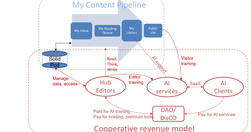
The 3rd part of my 1/1/2023 bundle of 5 posts looks at how AI could turbocharge collective intelligence "and finance the resulting ecosystem, providing an alternative to Big Tech AI monopolies".
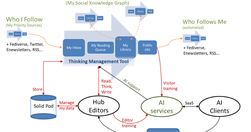
I've been invited to write a chapter for an upcoming book on Personal Knowledge Graphs (PKG). My chapter will encompass each user’s PKG, the Social Knowledge Graph created by networking them together via the Fediverse, Solid hosting, AI writing tools and Decentralised Autonomous Organisations.This post provides a first draft of its Introduction, i…
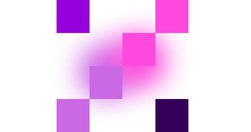
Like most guides, this one wrongly includes 'blogs' in web1.0, with "people creating and posting their own content" happening later, in an era dominated by big companies. It's as if bloggers weren't posting content before 2005.“the internet owned by the builders and users, orchestrated with tokens... including decentralized social networks, “play-…

"NFT stands for nonfungible token. But what does it actually mean? an uncopyable digital asset linked to a JPEG, which can be used to mark that particular copy of the JPEG as the “real” one... like the certificate of authenticity you might get if you bought an expensive sculpture. community or pfp (profile picture) NFTs... a series of unique but…
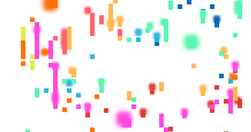
"for nearly a decade... my own views have whipsawed between extreme skepticism and cautious optimism. These days... a crypto moderate... much of the crypto market consists of overvalued, overhyped and possibly fraudulent assets ... [but] it isn’t all a cynical money-grab, and that there are things of actual substance being built" Most explainers…
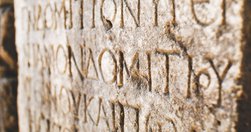
the vast majority of defi apps rely heavily on oracles, middleware entities that connect smart contracts to resources outside of their native blockchains. Without oracles, blockchains are like computers without internet access... Often referred to as hybrid smart contracts ... [oracles enable] smart contracts that can react to real-world events a…
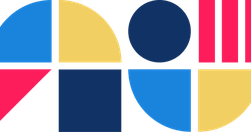
"DAOhaus is a no-code platform for launching and running DAOs. It is owned and operated by the community. All DAOs on the platform utilize the glorious open-source code of Moloch".Also see their glossary: https://daohaus.club/docs/users/glossary
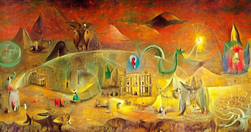
tokens Trojan horse principles of cooperatives directly into highly financialized spaces... [but] as tokens that double as governance rights can be sold on secondary markets... DAOs can learn from cooperatives’ emphasis on long termism... DAOs could introduce more forms of decentralized governance into cooperatives.
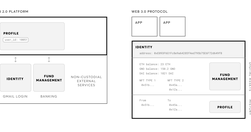
The Identity Stack ... Traditional online bank accounts represent balances as numbers stored in a centralized database... requires placing trust in a banking institution. Blockchain protocols plus private key cryptography ...introduce ... full possession of digital assets, without having to trust a third party. Hence the terms “self-custodial” or …

"Not every DAO mints its own currency, but ... Friends With Benefits,,, [has] $FWB... minted on the Ethereum blockchain... Membership: 75 $FWB... only one million $FWB tokens... When I first heard about Friends With Benefits this year, membership was already valued at $350. Today, it’s over $9,000."... like most DAOs, grants one vote per token, in…
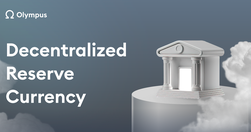
"Olympus is building a community-owned decentralized financial infrastructure to bring more stability and transparency for the world.... Olympus was ideated by Zeus and built by a distributed pseudo-anonymous team."Sees itself a a "store of value: ... Stablecoins are vulnerable to inflationary policies, while Bitcoin or Ethereum suffer from marke…
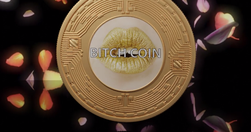
"The Fingerprints DAO collection is composed of NFTs that revolutionized the use of smart contracts as art.". Includes:"26 Autoglyphs, the first ... “on-chain” generative art pieces on the Ethereum blockchain... the event data contains the full output of the generator - codified instructions, in a character art pattern, to the artwork itself""Digi…
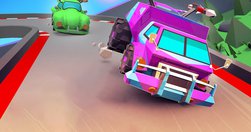
OP Arcade is:HTML5 game platform, with tournament competitionsgame developers contribute games which are transformed into fractionalized NFTs buyers collect nfts, co-own gamesplayers can play for free (?)DAO for "game owners to make proposals, vote for game updates, fund additional development"The community: "players, game owners and developers wo…
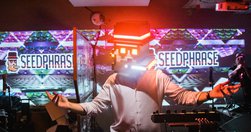
Starts by covering the first IRL NFT/crypto conference, before seguing: "smart investors are not buying seven-figure JPEGs these days... looking past NFT artwork entirely... to Web3... decentralized internet service [running] on public blockchains, with token-based reward systems that allow users to profit from their online activities."electronic …
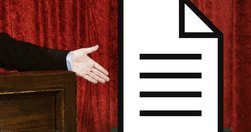
NYT's Kevin Roose writes "a column about NFTs that is, itself, being turned into an NFT and put up for auction". Good definition of an NFT: "digital collectible item stamped with a unique bit of code that serves as a permanent record of its authenticity and is stored on a blockchain... can be bought and sold ... can’t be deleted or counterfeited. …
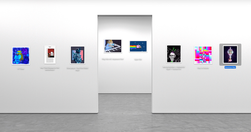
NFTs, or nonfungible tokens, represent a unique relationship between owner, artist and art. They are "digital files created using blockchain computer code... essentially impossible to duplicate" and so can be owned & resold, like any work of art. Anyone can download a copy of the art, but the NFT is unique. Noone cares if the art is copied and d…
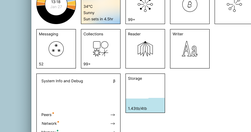
Urbit looks like a fascinating platform to build myhub on: “an open-source decentralized internet project... [to] give control of computing back to regular people... At its most basic level, an Urbit is:A super-private (virtual) computer, combined withan ID, which isconnected peer-to-peer with other Urbit computers"Urbit user access their Urbit i…
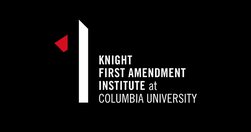
Given the myriad problems posed by social media platforms - content moderation, disinformation, censorship, privacy, anti-trust - this article "proposes an entirely different approach... that enables more free speech, while minimizing ... trolling, hateful speech, and large-scale disinformation efforts... also might help users ... regain control o…
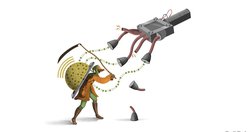
Overview of efforts to put data back into the hands of people. "platforms’ business models depend on network effects and scale to keep users engaged and to sell more advertising... a culture of virality that... poisons public discourse." Moreover, their data dominance is stifling competition & innovation. " So trustbusters are on the warpath... An…
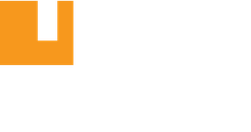
with digital technologies changing the nature of trade, Singapore’s locational and infrastructural advantages may no longer be as strong... Singapore must reinvent itself as a hub for the age of digital trade... think like a platform nation...
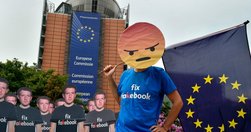
The EU’s measures are still designed to target the disinformation of yesterday rather than that of tomorrow... should focus on the coming wave of disruptive technologies... four emerging threats in particular: the democratization of artificial intelligence, the evolution of social networks, the rise of decentralized applications, and the “back en…

Everipedia ... seeks to become a better version of [wikipedia] ... moving to a blockchain.... a points system where creating articles and approved edits amasses “IQ.” ... a token-based currency, giving all existing editors ... a real, financial stake in Everipedia... turns Everipedia into a peer-to-peer resource... effectively uncensorable.

The record is incorruptible... this sort of recordkeeping is valuable for journalism: it allows us to maintain archives that can’t be censored or altered after the fact... an ad-free publishing economy on Civil’s Ethereum-based platform... Popula is accountable to its readers alone, and is impervious to the interests and agendas of advertisers or…
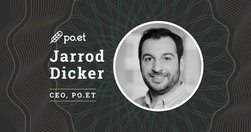
Po.et is a shared, open-source universal ledger designed to track ownership, attribution and the marketplace flow of the world’s creative assets through a never-before-imagined chain of value... a better model for the media ecosystem... where creators are paid for what they can do instead of what is required of them by an old and broken paradigm..…

the solution to both crises facing journalism may come from the same technological root: blockchain... An ecosystem of micropayments... as the holy grail for online journalism... Blockchain technology can create both chains of authenticity and a level of security... Sludge is one of the “first fleet” of around 20 newsrooms ... on a new blockchai…

STEEM’s Smart Media Tokens allow any website powered by curation (Likes, Up-votes, add-to-favourites, etc.) to reward users for creating and curating content.

Blockchain ... creating alternatives to the current corporation owned second layer of the internet... to make quality content truly democratic... Medium ... made itself decentralized... a blockchain with a dedicated token underlying all of the content ... reward content creators... governed only by the rules... But this token would also create an…
Relevant Overviews
- Content Strategy
- Fediverse
- Online Strategy
- Online Community Management
- Social Media Strategy
- Content Creation & Marketing
- Digital Transformation
- Thinking tools
- Blockchain, Crypto, NFTs etc
- Personal Productivity
- Innovation Strategy
- Communications Tactics
- Social Web
- Media
- Politics
- Communications Strategy
- Science&Technology
- Business
- Large language models